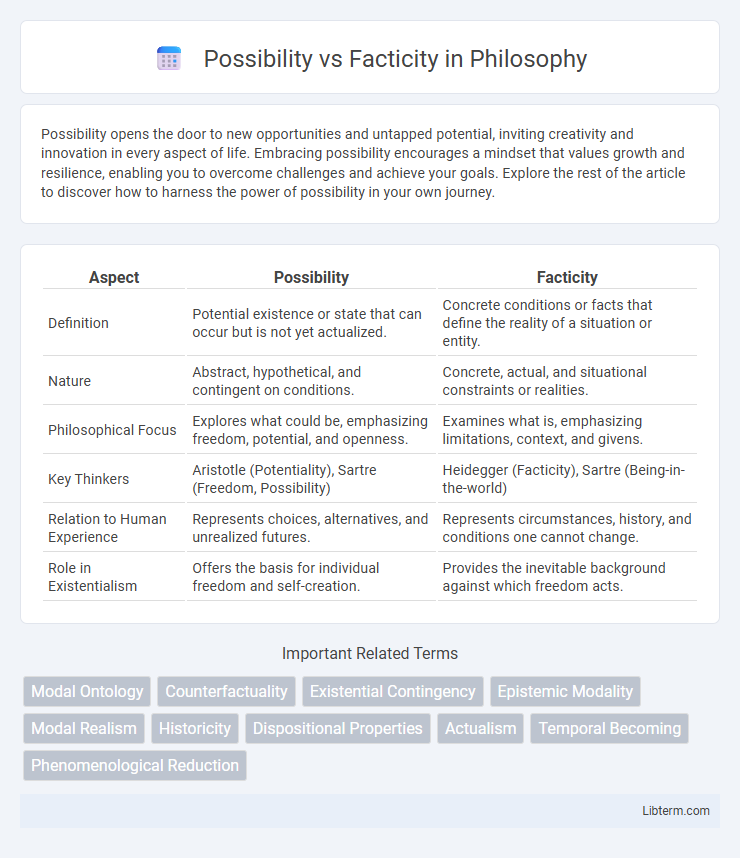Possibility opens the door to new opportunities and untapped potential, inviting creativity and innovation in every aspect of life. Embracing possibility encourages a mindset that values growth and resilience, enabling you to overcome challenges and achieve your goals. Explore the rest of the article to discover how to harness the power of possibility in your own journey.
Table of Comparison
| Aspect | Possibility | Facticity |
|---|---|---|
| Definition | Potential existence or state that can occur but is not yet actualized. | Concrete conditions or facts that define the reality of a situation or entity. |
| Nature | Abstract, hypothetical, and contingent on conditions. | Concrete, actual, and situational constraints or realities. |
| Philosophical Focus | Explores what could be, emphasizing freedom, potential, and openness. | Examines what is, emphasizing limitations, context, and givens. |
| Key Thinkers | Aristotle (Potentiality), Sartre (Freedom, Possibility) | Heidegger (Facticity), Sartre (Being-in-the-world) |
| Relation to Human Experience | Represents choices, alternatives, and unrealized futures. | Represents circumstances, history, and conditions one cannot change. |
| Role in Existentialism | Offers the basis for individual freedom and self-creation. | Provides the inevitable background against which freedom acts. |
Defining Possibility: Beyond Mere Potential
Possibility transcends mere potential by encompassing conditions under which an event or state of affairs can actualize, rooted in logical, physical, or conceptual frameworks. It involves not only what could happen but also what is coherent with the governing laws and facts of a given context. Differentiating possibility from facticity highlights the interplay between what is conceivable and what concretely exists or occurs.
Understanding Facticity: The Weight of What Is
Facticity refers to the concrete details and conditions that define our existence, such as historical, social, and physical realities that are unchangeable and must be acknowledged. Understanding facticity involves recognizing these limitations as the foundational context within which possibilities emerge and choices are made. This awareness highlights the tension between what is given and the potential for what can be, emphasizing the importance of engaging with the present's undeniable truths to navigate future actions effectively.
Philosophical Roots: Possibility and Facticity in Existentialism
Existentialism explores the tension between possibility and facticity as integral to human existence, emphasizing that while facticity refers to the concrete realities and conditions individuals cannot change, possibility represents the potential for freedom and self-determination. Philosophers like Jean-Paul Sartre argue that human beings are condemned to be free, meaning they must navigate the constraints of their facticity while exercising authentic choice within their possibilities. This dynamic interplay underpins existentialist notions of responsibility, as individuals continuously shape their essence through actions taken in the context of their given circumstances.
The Tension Between What Can Be and What Is
The tension between possibility and facticity highlights the conflict between human freedom and the constraints of reality, where possibility represents potential actions and facticity embodies the given circumstances beyond control. Existentialist philosophy, notably Heidegger and Sartre, emphasizes that while individuals confront their facticity, they retain the capacity to choose and transform their being through projecting possibilities. This dynamic interplay underscores the ongoing negotiation between what can be realized and the immutable conditions that define existence.
Everyday Life: Navigating Between Possibility and Facticity
Everyday life constantly oscillates between possibility and facticity, where individuals confront concrete circumstances yet imagine alternative actions and outcomes. The tension between factual constraints, such as social roles or physical limitations, and the freedom to choose enables meaningful navigation through daily decisions. Embracing this dynamic balance empowers personal growth by acknowledging what is given while exploring potential futures.
Language, Meaning, and the Limits of Possibility
Possibility and facticity interact within language to shape meaning by defining the boundaries between what can be conceived and what is actualized. Language structures both potentialities and constraints, highlighting how semantic frameworks limit or expand our understanding of what is possible. This dynamic underscores the intrinsic limits of possibility, as meaning is always bound by the factual conditions that language seeks to represent.
Facticity and Freedom: Constraints on Human Choice
Facticity imposes real-world limitations on human freedom by grounding choices within existing circumstances like physical laws, social norms, and historical context. These constraints shape the framework within which freedom operates, highlighting that human autonomy is exercised not in a vacuum but amidst predetermined conditions. Understanding facticity reveals how freedom is a negotiation between possibility and the factual boundaries that define human agency.
Creativity and Innovation: Harnessing the Power of Possibility
Harnessing the power of possibility drives creative thinking by expanding the boundaries of what can be imagined and achieved, contrasting with facticity which grounds ideas in existing realities. Creativity and innovation thrive when individuals embrace possibility as a catalyst for exploring uncharted territories and generating novel solutions. This dynamic interplay encourages breaking free from constraints, allowing for transformative advancements across industries and disciplines.
Ethical Implications: Responsibility Amidst Facticity
Ethical responsibility emerges distinctly within the tension between possibility and facticity, where facticity represents the concrete conditions shaping human existence and possibility embodies the freedom to choose beyond these constraints. This dynamic challenges individuals to acknowledge their facticity, such as societal roles and historical context, while embracing the ethical imperative to act authentically and assume responsibility for their choices. Navigating this interplay underscores the necessity for moral accountability, as disregarding facticity or ignoring freedom undermines genuine ethical engagement.
Embracing Ambiguity: Living Authentically with Both
Embracing the dynamic interplay between possibility and facticity empowers individuals to live authentically by acknowledging both potential futures and present realities. This approach fosters resilience and adaptability, encouraging a mindset that navigates uncertainty without relinquishing genuine self-expression. Philosophical frameworks like existentialism highlight the importance of accepting ambiguity as a fundamental aspect of human existence, enabling deeper personal growth.
Possibility Infographic

 libterm.com
libterm.com